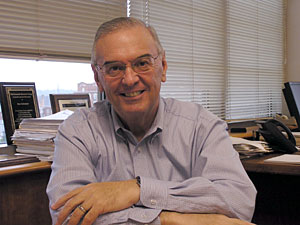|
Audio
Photos
|
 |
| Revenue Commissioner Dan Salomone said the increases stem from rising home values and local government decisions. (MPR Photo/Laura McCallum ) |
St. Paul, Minn. — News last week that St. Paul homeowners could see a 20-percent increase in their property taxes prompted some local officials to point fingers at the state. This year's K-12 education bill boosted funding for schools, but some of the additional money comes from local property taxes. The Legislature and governor have made other tax changes to help balance the state budget that local officials say will end up on local property tax bills.
"We're calling them the tax shifts," said Chris Samuel, Ramsey County manager of property records and revenue. "And that accounts for about 26-percent of the increase in taxes on a median-valued home in St. Paul."
St. Paul isn't the only city looking at a steep increase. Property taxes could go up statewide by more than 10 percent next year, according to preliminary estimates from the state Revenue Department and the nonpartisan House research staff.
The increase for homeowners could be even higher -- closer to 12 percent. That's partly because home values are going up faster than business property values. Also, reforms passed by the Legislature in 2001 lowered rates for all property classes, but particularly for commercial/industrial property. So when property taxes go up, homeowners pay a bigger portion of the increase than they used to.
The chair of the Senate Taxes Committee, Larry Pogemiller, DFL-Minneapolis, voted against the 2001 reforms because he thought they would shift the property tax burden to homeowners.
"Property taxes and fees are not based on people's ability to pay," Pogemiller said. "And with rapidly increasing market values ... you end up with a situation where the bulk of their services are going to now be paid for on their property tax. And I think that was something that was rejected about 30 years ago in Minnesota."
Pogemiller said state budget cuts to cities and counties have forced them to rely more heavily on property taxes. He said local governments are raising taxes simply to maintain services such as police and fire. Local governments and schools also face rising energy and health care costs.
State Revenue Commissioner Dan Salomone said while it's common for local officials to blame the state for their financial situation, he doesn't think state decisions are at fault. He said much of the increase for homeowners stems from rising property values, which the Legislature can't control. Salomone supported the 2001 property tax reforms, because he said they lowered business rates to make them more in line with other states. Also in the reforms, the state took over the general education levy, which Salomone said made property taxes more local.
"As we made the local levies more for local things, the idea was that then communities should be more free to control that levy, and the corollary to that is that legislators and the governor should be less concerned about that," Salomone said.
But state officials have made other decisions that have partly reversed those reforms, according to Scott Croonquist, executive director of the Association of Metropolitan School Districts. He said the Legislature held the basic education formula flat for two years, and cut other education programs. Now, districts are raising levies to pay for some things the state used to fund.
"We have slowly backpedaled, I guess, on that reform, where we have shifted back some of the responsibility of paying for education back to the local property tax, and in fact, here we are at the end of 2006, we will be close to getting back to the level of statewide school property tax that we were at in 2001," said Croonquist.
Homeowners faced with double-digit property tax increases may not understand the complicated mix of local and state decisions. They may just want a lower tax bill. House Taxes Committee Chair Phil Krinkie, R-Shoreview, said he thinks the situation may generate interest in his proposals for a property tax freeze and a taxpayer satisfaction survey. Citizens could return a card if they didn't like the level of increase, and enough responses would force a referendum on the proposed hike.
"Plain and simple, what we need to do is try to hold the line on increasing costs in government," Krinkie said.
It's possible that property taxes won't be as high as the early estimates. Commissioner Salomone points out that preliminary estimates last year predicted a 10-percent increase, and the final average was around seven percent.





